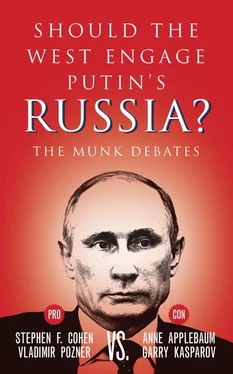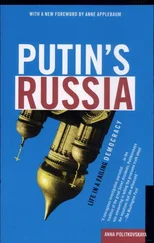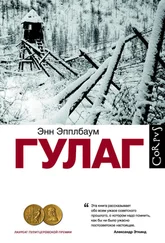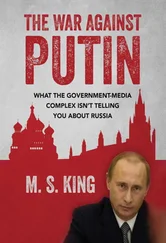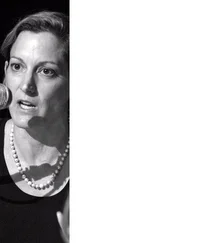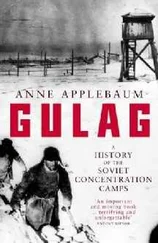GARRY KASPAROV: Co-operation implies that you make concessions and that you do something that may hurt you and your interests in order to bolster your relationship with your partner. In both cases, Russian interests are winning. Russia has been supplying Iran with nuclear technology, so let’s not forget that this uranium goes to Russia. Russia will hold the key, which enhances Putin’s position in the international arena.
And let’s not forget that these negotiations went on forever, and Putin’s interest was always to keep the pressure on in the region because it helped to push up oil prices, something vital to Putin’s financial survival.
As for Syria, Putin’s priority from day one was to save a mass murderer named Bashar al-Assad, and he’s succeeded. There are many reasons why he stepped in to do so: one was probably some form of dictators’ brotherhood. Believe me, after so many dictators were washed away by public anger in the Arab world, Putin didn’t want to allow Assad to be toppled because then Russians could see that dictators were also vulnerable.
And let’s not forget that Putin is always looking at the map of the pipelines. Gas supplies are very important. They are his grip on Europe. Syria is potentially vital for a Qatar, Iraq, Syria, and Turkey pipeline, which could make Russian gas redundant. So in both cases Putin played the role of a saviour — the white knight at the eleventh hour — but he was the greatest beneficiary.
RUDYARD GRIFFITHS: How do you all respond to that?
VLADIMIR POZNER: If Mr. Kasparov is saying that Putin stands up for Russia’s interests, then I would have to suppose that he does, from a certain viewpoint. I read your interview opposite mine in the newspaper where you kind of laugh at Putin’s popularity. You know as well as I do that the people who did the poll — the Levada-Centre — are honest people.
The poll was not government sponsored — the Levada-Centre is a very respectable organization. The poll showed that over 80 percent of Russian people support Putin. Now, there has got to be some reason for it. These are not stupid people. Propaganda is propaganda, but these are people who have lived in the country a long time. They know what propaganda is. So what do they see in Putin?
I’m not defending Putin; I’m explaining a situation. What they see in Putin is a man who has brought Russia back. Russians no longer feel that they are in second place, that they are not a great nation. They’ve been told by others previously to just get out of our face. And now they can say, we’re back and if you don’t like us we don’t care. But we’re back thanks to Putin. This is the sentiment and something that has to be understood, whether good or bad. It is a fact. And there is a reason for it. It’s not just because Russia is an autocratic state. When my colleague, Stephen F. Cohen, talks about the Russian media he is right. There is a lot of media that would dispute what Ms. Applebaum is describing, like Novaya Gazeta , Komsomolskaya Pravda , and Moskovskij Komsomolets.
ANNE APPLEBAUM: We give you Novaya Gazeta .
VLADIMIR POZNER: What I’m saying is that they are about as different as ABC, NBC, and CBS. It’s propaganda on both sides.
GARRY KASPAROV: Wow.
ANNE APPLEBAUM: I haven’t heard that kind of moral equivalence in a long time.
VLADIMIR POZNER: The people here do not read Ukrainian or Russian newspapers, so they don’t know what’s happening.
GARRY KASPAROV: When was the last time you were in Kiev?
VLADIMIR POZNER: This is funny. I was in Kiev two and some years ago to receive the honourary title of Man of the Year of Ukraine.
RUDYARD GRIFFITHS: There we go: Man of the Year of Ukraine. Let me bring Stephen into this conversation.
STEPHEN F. COHEN: I hope you noticed that the chess master just got checkmated. Look, I understand this fixation on Putin. I really do. Personally, I don’t care much about Putin. I wish I were going to live long enough to see how my fellow historians evaluate Putin’s role as a leader of Russia. And I think it is going to be a big debate, the positives and the negatives.
But let me address the elephant in the room: Wasn’t NATO expanding toward Russia’s borders when we were supposedly embracing the country in the 1990s?
Think about it like this: What if I found out where you lived and parked all my military equipment across the street. And then I told you that I was just there for your security. I’m making sure no one breaks into your house. And then I notice that you’ve brought a few folks around who have brought all their military equipment, and that now you’re across the street from my house, too. But don’t worry because its all for your security — NATO is about democracy and you need democracy.
Let’s be serious. We were continuously warned by liberal Russians — people we liked in Russia — that we were pushing too far. Eventually, rightly or wrongly, the Russian political elite decided that this expansion of NATO was a way of making sure Russia would forever be a subservient state to the West.
And the brass ring — or rather, the silver ring — in all of this was Georgia. A proxy war ensued in 2008 as a result. Ukraine has also been another brass ring; it is openly spoken about in Washington.
If you think this is good policy, and if you believe we should push our power as close to Russia as we can and bring Ukraine into the Western security system because it’s ultimately good for us, then say so and then let’s debate that issue. But don’t go on about the demon Putin, because the Russian understanding of Ukraine mirrors the concept of NATO expansion from the beginning.
The Russians invaded Ukraine because the Russian political class believed that NATO was on its way not only to Kiev, but also to Crimea. Now, we can say that’s crazy, but perception in politics is everything. If you isolate Russia, they’re going to perceive it in an even more extreme form, and we will never be safe.
RUDYARD GRIFFITHS: Let’s hear from Anne on NATO.
ANNE APPLEBAUM: I’ll say this because you invited me to, Mr. Cohen, but that’s crazy. First of all, why did NATO expand? Let’s tick back the clock again to the 1990s. Who wanted expansion? It was the central Europeans who wanted it. It was not an American idea. I remember because I was in Warsaw at the time. The central Europeans wanted it because they were afraid: they were afraid of Russia, even then. They saw what Russia was becoming.
The United States very reluctantly agreed to expand the security zone so that the people — all 100 million of them — would be able to transition to democracy and begin economic development and growth without fear of invasion. And it worked. It was unbelievably successful.
STEPHEN F. COHEN: It worked?
ANNE APPLEBAUM: It worked for the central Europeans: a hundred million people were safe. A region that had been the source of two world wars has not been a source of conflict since then. How did we do it? The strategy was carried out in a manner designed to reassure Russia from the beginning. Russia was included in every piece of negotiation. No NATO bases were ever placed in the new member states.
Until 2013, no exercises were ever conducted in new member states. In response to Russian objections — and this is a very important point — both Ukraine and Georgia were openly and definitively denied NATO membership in 2008, which has been repeated ever since. It is no longer on the table. Mr. Cohen, why are you looking at me that way?
STEPHEN F. COHEN: In 2008?
ANNE APPLEBAUM: In 2008 at a NATO meeting, they said there would be no membership plan for Ukraine and Georgia. And since then it hasn’t been on the table.
STEPHEN F. COHEN: They said something else at that meeting in 2008, that NATO membership remains open to Georgia and Ukraine.
Читать дальше
